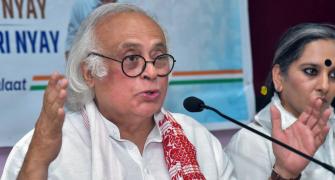Infosys is an Indian wonder, but 98 per cent of its business comes from the rest of the world. Most of its customers live and work in the US, where offshorers like Infosys tend to be viewed as faceless armies of software engineers and call-center operators on the other side of the world, saving Americans money while stealing their jobs.
And with only three per cent of its employees hired outside of India, Infosys' workforce is not yet as global as Nandan Nilekani's flat-world philosophy.
All that is starting to change. Infosys established its financial services office in New York five years ago to be closer to the big banks and brokerages that buy its services. A third of Infosys financial services staff work in the US now. This year the company started recruiting at US colleges and sending "freshers" to India for training.
The first 126 just finished boot camp in Mysore and will work in Infosys offices throughout India for a few months before being shipped back to engineering and marketing posts in America. The plan is to have more Americans on the ground working face-to-face with customers there while keeping coding and processing tasks at home.
In Pictures:
The pros and cons of outsourcing in India
The world's best big tech companies
"We have no cost advantage in the US," says Nilekani. "What we have is discipline and a superior way." And, he adds, "the cost of any business we send back to India is significantly less."
For many clients the new American face of Infosys is Stephen Pratt, the head of Infosys Consulting, a two-year-old subsidiary in Silicon Valley. Advising clients on better ways to run their businesses "can't be done from the other side of the world," says Pratt. "It can't even be done from the other side of the city."
Pratt was a partner at Deloitte Consulting, where he built the firm's customer relations management practice from scratch 12 years ago. He was working on a project with Deloitte colleague Raj Joshi that took them to India in 2003.
"Raj and I could see this was the future." They approached Nilekani three years ago with an idea: Why not merge high-touch North American-style consulting with the processing power of thousands of Indian software engineers to build a new kind of consulting firm? Turns out that Nilekani was thinking the same thing, says Pratt.
Pratt and Joshi brought in a few other rainmakers, including cofounders Romil Bahl from EDS, Ming Tsai from IBM and seasoned consultants from Capgemini and other global competitors. Most of these competitors are, in turn, hiring by the thousands in India to set up their own back-office pools.
In Pictures:
The world's best big companies
India's 40 richest
But while the rest of the consulting world is trying to figure out India, Infosys hopes to steal some of their business. Most of Pratt's potential customers are already familiar with Infosys and know the company by its reputation in IT outsourcing. Some of them share Pratt's view about the future--and hope to save a little money.
One way Pratt keeps costs down is by leasing compact, out-of-the-way offices where workers have access to "touchdown" spaces when they need them, instead of permanent offices. "Most of our people work on-site. It's a bad sign when there are a lot of consultants in the office," says Pratt. "Our competitors have floor after floor of empty office space," and somebody has to pay for all that overhead.
Infosys can then push much of the number crunching and analysis work to lower-cost colleagues in India and China. A partner working with a client in the US will bill $221 an hour. But any work done in India is billed at $35 an hour. "We are generally 30 per cent to 35 per cent cheaper than our North American competitors.
And we are faster because we can offer a 24-hour workday," says Pratt. Competitors like ibm may be hiring a lot of people in India, "but it takes a long time to change the mindset of the partners," says Pratt. "Are you going to send that request for a report to India or to the analyst down the hall whom you've been working with for years?"
Some consulting business comes in-house from people such as Ashok Vemuri. Vemuri heads Infosys Technology's global banking and capital markets business from Rockefeller Center in New York City, where he can be close to his biggest clients. Infosys Technology helps Wall Street firms and big banks do everything from settling currency trades to spitting out reports required by regulators, says Vemuri.
Over the holidays Infosys will be making sure that a gift card used at, say, Barnes & Noble, is debited from the correct account--a task that can require several different financial and retail systems communicating with one another. Infosys brought in $614 million--29 per cent of its total revenue last year--processing such transactions and billing for all the other banking and capital markets work Vemuri oversees.
"Banks, at the end of the day, are now technology companies," he explains. "Someone needs to make sure all that technology they bought is doing what its supposed to do and keeping it repaired and upgraded."
Until a few years ago Vemuri was only looking to win IT outsourcing contracts. "But as we grew, we realised it was more important to understand our clients' business and to have our people close by," he says. Of the 10,000 in his division, 30 per cent are based in the US. Most are on visas from India, but Infosys is trying to change that by recruiting locally.
Getting to know its customers better was another reason to start Infosys Consulting. "One of the mistakes that technology consultants made in the 1990s was to view technology projects in isolation," says Pratt.
But new technologies can change the whole process of a business and the way its employees and customers behave. With a consulting business, says Vemuri, "we can make the recommendations about whether it's better to buy or build, how to manage the change and then do the heavy lifting back in India."
It's not just for the labor arbitrage, either, he says. With one bank facing new regulatory requirements from Basel II, an international standard for how much money banks must keep on hand, Infosys bid at a higher price than an international competitor. "But we were able to demonstrate we could do it faster and that our bespoke solution was the most robust," says Vemuri.
Still Pratt and his partners face a formidable task displacing incumbent consultants, which have learned their customers' business inside out after years--sometimes decades--of working together. "But the world has changed a lot since 1990, with the emergence of a global workforce in China and India," says Pratt. "We have a lot of clients saying, 'We want to be more like you guys.'"
In Pictures:
The Forbes 40 India







